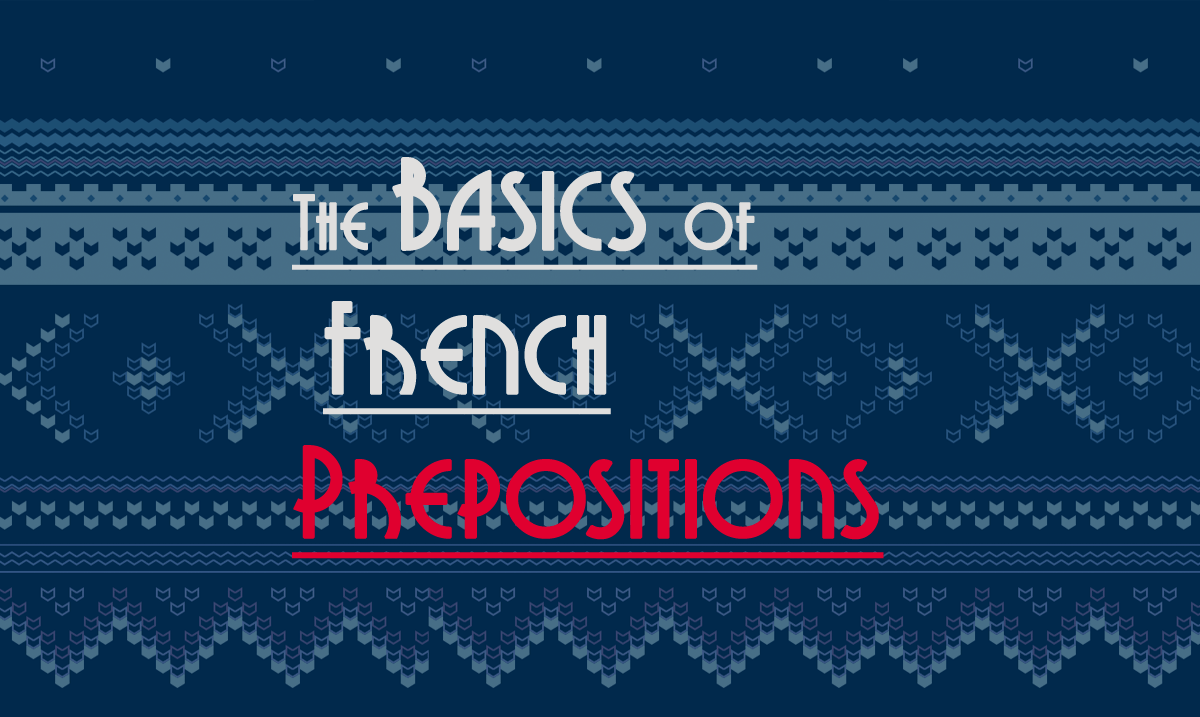Reading time: 4 minutes
Difficulty: Intermediate
We use prepositions so much in our daily speech but we often take these things for granted.
Most of the time, it results in misuse of English prepositions or interchanging our ins and ons and ats. Therefore, a clear grasp (or a working knowledge at the very least) of English prepositions is in order before we could thoroughly learn about its French counterparts.

Still Stuck at Intermediate French?

Break through the plateau with our proven coaching and study method.
We operate on the premise that before you can take on another language, you have to be familiar with your how your very own language works first.
So on that note, let's take a quick look at what prepositions are in the English language.
- Prepositions function as linking words that show the relationship between the other words in the sentence.
- Prepositions help put into perspective the time and place of a certain topic.
- These include the words at, to, from, for, with, into, between, beside, under, within, and several others.
- Prepositions are followed by a noun, a pronoun, or an English word that ends in -ing.
Examples:
It's from her.
He's in trouble.
It's made for handling food.
REMINDERS ON WHEN AND HOW PREPOSITIONS ARE USED
- Prepositions are used before a noun or a pronoun.
- Prepositions can also appear after some adjectives, linking it to the rest of the sentence.
- In English, it is quite common for informal sentences to end in a preposition (though this is considered bad grammar), but in French, it is never allowed.
- Prepositions do not change its form. There are no plural forms, tenses, or genders (whew!!! Thank heavens!)
- Prepositions can have an object, but it can also be optional in some cases.
- Some prepositions consist of more than one word.
- In French, just like in English, the actual usage of some prepositions can be idiomatic. This means its use could often vary depending on the sentence itself.
- There is no actual 1:1 translation of English and French prepositions. The best we can do is learn the words which are more or less their equivalents.
Now let's get to the French prepositions list!
LIST OF PREPOSITIONS IN FRENCH
| French preposition | English equivalent | Tips |
| à | at, in, on, to | • This is not to be confused with the il/elle/on form of avoir (il a). • Remember: à+le becomes au; à+les becomes aux • There are varied uses of à. • à can be used with de to mean from...to. • Other uses of à are: to describe how someone looks or what he/she is wearing, what a certain thing is made of, how something is done, mode of traveling, what a thing is used for, to tell a certain time, for distances or rates, and in common sayings and phrases. • Examples: à la maison (could mean at home or to the house depending on how it is used) à la campagne (in the country) au lit (in bed) de Londres à Paris (From London to France) au premier étage (on the first floor) à Noël (at Christmas) à bientôt (see you soon!) |
| après | after | Examples: après vous! (after you!) après le déjeuner. (after lunch) |
| avant | before | Examples: avant toi (before you) avant la maison (before the house) |
| avec | with | Examples: avec moi (with me) avec mon père (with my father) |
| chez | at/to __'s house or place; on/from the area of, from/at __'s | Examples: chez moi (at my place) Elle est chez Frederic (She's at Frederic's house) Elle va chez Frederic (She's going to Frederic's house) |
| contre | against | Example: contre le mur (against the wall) |
| dans | in(side), into | Examples: dans deux mois (in two months) ll est dans sa chambre. (he's in his room) |
| de | of, from | • de+le becomes du, de+les becomes des • de becomes d' when it comes before a word that starts with a vowel, h, or the word y. • Used with à to mean from... to. • Used to tell who or what something belongs to. • Tells us what something is made of. • Tells us what a thing is used for. • Used in superlatives • Used in phrases that refer to quantities. Examples: de Paris (from Paris) un ami de la famille (friend of the family) un tasse de café (a cup of coffee) |
| depuis | since, from, for | • Can be used to talk about an action that started in the past and is still going on (present tense is used for this) Examples: je travaille depuis deux jours (I've been working for two days) depuis 1922 (since 1922) |
| derrière | behind | Example: derrière la porte (behind the door) |
| devant | in front of, outside (the front of) | Example: Elle est assise devant moi. (she's sitting in front of me) |
| en | in | • en is never followed by articles like le, du, des. • Usually being used with feminine countries and some figurative expressions. • Can also talk about years and months and seasons. Examples: Nous habitons en France. (we live in France) en 1983 (in 1983) en janvier (in January) en hiver (in winter) en train (in train) |
| entre | between, among | • Entre...et means between..and in English. Example: Le bureau est fermé entre 13 et 14 heures. (The office is closed between 1 and 2 pm) |
| envers | towards | • Envers is used to mean"towards" as in an action to a person. (Example: She was hostile towards him.) • When referring to a physical motion such as going towards something, vers is used. |
| environ | about, approximately | Example: environ 20 personnes. (about 20 persons) |
| par | by, through, per, with | Examples: deux par deux (two by two) par email (by email) |
| pendant | During, for | Examples: pendant l'été (during the summer) pendant plusieurs mois (for several months) |
| pour | For, in order to | Examples: pour homme (for him) pour Paris (for Paris) |
| sans | without | Example: sans sucre (without sugar) |
| sauf | except | Example: Tout le monde vient sauf lui. (everyone's coming except him.) |
| selon | according to, depending on | |
| sous | under(neath) | Example: sous terre (underground) |
| sur | on | Examples: sur la table (on the table) sur la politique (on politics) |
| vers | towards | Also applicable for use with dates to mean "in around...", "circa..." |
OTHER PREPOSITIONS
Some prepositions contain more than a single word. These are the following:
| au bord de | at the edge of at the side of |
| au bout de | after |
| à cause de | because of |
| au-dessous de | below |
| au-dessus de | above |
| au fond de | at the bottom of |
| au milieu de | in the middle of |
Prepositions can be quite a headache to learn, whether in English or French. In fact, even advanced learners often experience confusion when it comes to the different prepositions and the out-of-the-box uses for some.
To thoroughly familiarize yourself with the proper uses of the different prepositions, we suggest that you immerse yourself with the French language through reading and listening. This way, the prepositions will come to you easier and you'll be able to recall them faster.
If you need clarifications about prepositions in French and this French prepositions list, do not hesitate to contact us in the comment section.
Still Stuck at Intermediate French?

Break through the plateau with our proven coaching and study method.
P.S. You would be doing me a HUGE FAVOR by sharing it via Twitter or Facebook.
Here are some FAQs about French Prepositions
How do you use prepositions in French?
French prepositions are used before a noun or pronoun, or after an adjective to link words into a sentence. Prepositions can have an object, but that isn’t always the case. They are never used to end a sentence, and fortunately don’t have genders, tenses, or plural forms!
The usage of a preposition varies depending on the sentence, and some prepositions can be more than one word. Since French prepositions have no straightforward translation in English, we need to know our prepositions well!
What are some French prepositions?
à (at, in, on, to)
avec (with)
dans (in[side], into)
de (of, from)
en (in)
par (by, through, per, with)
sur (on)
How do you identify prepositions in French?
Similar to English, French prepositions help link words in sentences to add information about time, place, or even the number or people. They help to elaborate, so it is important to know your prepositions. If you can find a linking word that precedes some extra information, chances are that it’s a preposition!
But please study your prepositions so that not only can you identify them, but you can use them in your own sentences!

[…] The Basics of French Prepositions (talkinfrench.com) […]
Thank you! Have been searching for such a list as this.
You’re welcome!
[…] Learn the basics of French Prepositions. […]
Merci beaucoup!
tres utile
Monsieur Frédéric your lessons are wonderful I enjoyed them.
Merci beaucoup
Merci Ugo
Grands! Merci